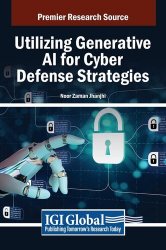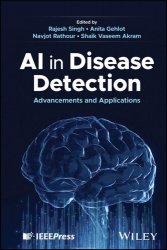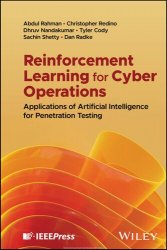 Название: Utilizing Generative AI for Cyber Defense Strategies
Название: Utilizing Generative AI for Cyber Defense StrategiesАвтор: Noor Zaman Jhanjhi
Издательство: IGI Global
Год: 2025
Страниц: 546
Язык: английский
Формат: pdf (true), epub
Размер: 18.9 MB
As cyber threats become increasingly sophisticated, the need for innovative defense strategies becomes urgent. Generative Artificial Intelligence (AI) offers a revolutionary approach to enhance cybersecurity. By utilizing advanced algorithms, data analysis, and Machine Learning, Generative AI can simulate complex attack scenarios, identify vulnerabilities, and develop proactive defense mechanisms while adapting to modern-day cyber-attacks. AI strengthens current organizational security while offering quick, effective responses to emerging threats. Decisive strategies are needed to integrate Generative AI into businesses defense strategies and protect organizations from attacks, secure digital data, and ensure safe business processes. Utilizing Generative AI for Cyber Defense Strategies explores the utilization of Generative AI tools in organizational cyber security and defense. Strategies for effective threat detection and mitigation are presented, with an emphasis on Deep Learning, Artificial Intelligence, and Internet of Things (IoT) technology. This book covers topics such as cyber security, threat intelligence, and behavior analysis, and is a useful resource for computer engineers, security professionals, business owners, government officials, data analysts, academicians, scientists, and researchers.
With the increase in the complexity and number of cyber threats, security practitioners and defenders are looking for enhanced and robust security practices and solutions for effective cyber defense. Traditional cyber defense practices have been facing several challenges including data silos, data privacy concerns, and limited collaboration between organizations. In addition, the centralized Machine Learning models have their limitations, in terms of heterogeneity and formatting of datasets, for addressing distributed cyber threats. Federated Learning has emerged as a decentralized Machine Learning approach with its potential for privacy preservation and contextualizing data for collaborative cyber defense. Federated Learning has several characteristics, such as model aggregation, federated averaging, and differential privacy, which enable the collaborative training of Machine Learning models across distributed datasets.
In traditional Machine Learning approaches, the data is centralized for training. In the era of Artificial Intelligence and Machine Learning, Federated Learning is a transformative technology to enhance the training of models across various devices in a decentralized manner. Federated Learning supports privacy preservation due to models training done directly on the devices, for example, IoT-based devices, edge servers, and other smart devices. Federated Learning enables the data aggregation from diverse sources and brings the benefits of privacy protection and reduced data transfer requirements. There are several applications of Federated Learning in various sectors where critical information needs to be protected, such as manufacturing industries, finance, healthcare, security challenges and many more.
Coverage:
The many academic areas covered in this publication include, but are not limited to:
Anomaly Detection
Authentication Technologies
Behavior Analysis
Cyber Security
Data Analytics
Deep Learning
Defense Strategies
Federated Learning
Generative AI
Information Sharing
Internet of Things (IoT)
Malware
Risk Assessment and Mitigation
Threat Intelligence
Variational Autoencoders (VAEs)
Contents:
Скачать Utilizing Generative AI for Cyber Defense Strategies
[related-news] [/related-news]
Комментарии 0
Комментариев пока нет. Стань первым!
















